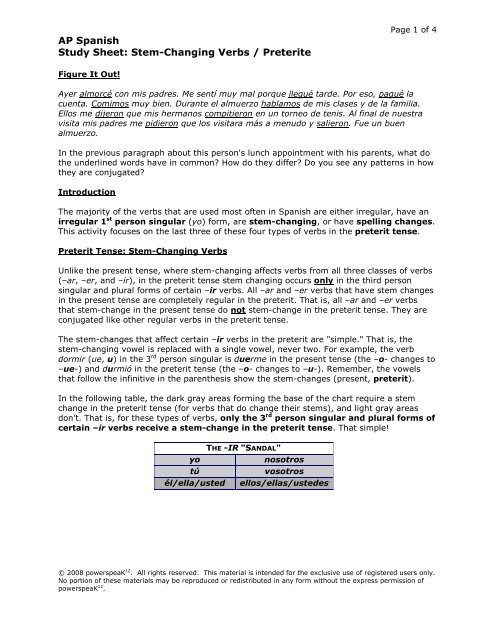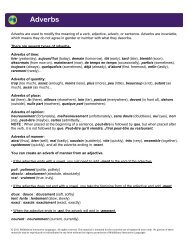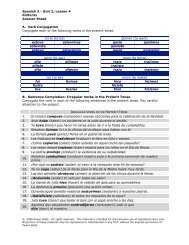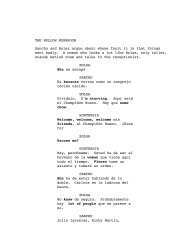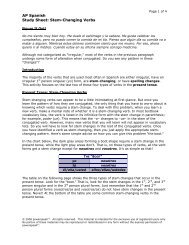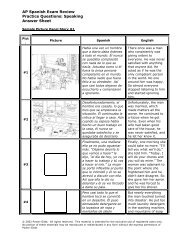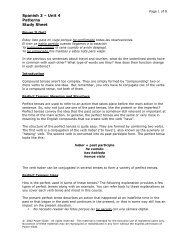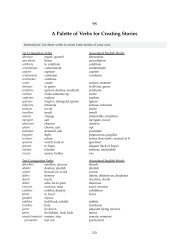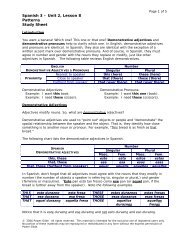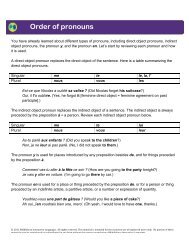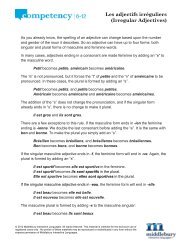AP Spanish Study Sheet: Stem-Changing Verbs / Preterite
AP Spanish Study Sheet: Stem-Changing Verbs / Preterite
AP Spanish Study Sheet: Stem-Changing Verbs / Preterite
Create successful ePaper yourself
Turn your PDF publications into a flip-book with our unique Google optimized e-Paper software.
<strong>AP</strong> <strong>Spanish</strong><br />
<strong>Study</strong> <strong>Sheet</strong>: <strong>Stem</strong>-<strong>Changing</strong> <strong>Verbs</strong> / <strong>Preterite</strong><br />
Figure It Out!<br />
Page 1 of 4<br />
Ayer almorcé con mis padres. Me sentí muy mal porque llegué tarde. Por eso, pagué la<br />
cuenta. Comimos muy bien. Durante el almuerzo hablamos de mis clases y de la familia.<br />
Ellos me dijeron que mis hermanos compitieron en un torneo de tenis. Al final de nuestra<br />
visita mis padres me pidieron que los visitara más a menudo y salieron. Fue un buen<br />
almuerzo.<br />
In the previous paragraph about this person's lunch appointment with his parents, what do<br />
the underlined words have in common? How do they differ? Do you see any patterns in how<br />
they are conjugated?<br />
Introduction<br />
The majority of the verbs that are used most often in <strong>Spanish</strong> are either irregular, have an<br />
irregular 1 st person singular (yo) form, are stem-changing, or have spelling changes.<br />
This activity focuses on the last three of these four types of verbs in the preterit tense.<br />
Preterit Tense: <strong>Stem</strong>-<strong>Changing</strong> <strong>Verbs</strong><br />
Unlike the present tense, where stem-changing affects verbs from all three classes of verbs<br />
(–ar, –er, and –ir), in the preterit tense stem changing occurs only in the third person<br />
singular and plural forms of certain –ir verbs. All –ar and –er verbs that have stem changes<br />
in the present tense are completely regular in the preterit. That is, all –ar and –er verbs<br />
that stem-change in the present tense do not stem-change in the preterit tense. They are<br />
conjugated like other regular verbs in the preterit tense.<br />
The stem-changes that affect certain –ir verbs in the preterit are "simple." That is, the<br />
stem-changing vowel is replaced with a single vowel, never two. For example, the verb<br />
dormir (ue, u) in the 3 rd person singular is duerme in the present tense (the –o- changes to<br />
–ue-) and durmió in the preterit tense (the –o- changes to –u-). Remember, the vowels<br />
that follow the infinitive in the parenthesis show the stem-changes (present, preterit).<br />
In the following table, the dark gray areas forming the base of the chart require a stem<br />
change in the preterit tense (for verbs that do change their stems), and light gray areas<br />
don’t. That is, for these types of verbs, only the 3 rd person singular and plural forms of<br />
certain –ir verbs receive a stem-change in the preterit tense. That simple!<br />
THE -IR "SANDAL"<br />
yo nosotros<br />
tú vosotros<br />
él/ella/usted ellos/ellas/ustedes<br />
© 2008 powerspeaK 12 . All rights reserved. This material is intended for the exclusive use of registered users only.<br />
No portion of these materials may be reproduced or redistributed in any form without the express permission of<br />
powerspeaK 12 .
<strong>AP</strong> <strong>Spanish</strong><br />
<strong>Study</strong> <strong>Sheet</strong>: <strong>Stem</strong>-<strong>Changing</strong> <strong>Verbs</strong> / <strong>Preterite</strong><br />
Page 2 of 4<br />
The following table shows the three types of stem changes that occur in the preterit tense.<br />
O (ue, U) E (ie, I) E (i, I)<br />
DORMIR (UE, U) – (to sleep) SENTIR (IE, I) – (to feel) PEDIR (I, I) – (to ask for)<br />
dormí dormimos sentí sentimos pedí pedimos<br />
dormiste dormisteis sentiste sentisteis pediste pedisteis<br />
durmió durmieron sintió sintieron pidió pidieron<br />
Note that each of these three examples of –ir verbs is followed by parentheses which<br />
include: first, the present tense stem change (which occurs in all verb forms except<br />
nosotros and vosotros), and second, the preterit tense stem change (which occurs only in<br />
the 3 rd person singular and plural). Also note that they are all –ir verbs.<br />
The infinitive forms of stem-changing verbs don't look any different from those that are<br />
completely regular. So when you learn a new verb, either in vocabulary lists or just while<br />
reading a passage, make a mental note of whether it is a stem-changing verb or not. The<br />
following table will help to get you started. It shows some common "simple" stem-changing<br />
verbs in the preterit.<br />
OTHER O (ue, U) VERBS OTHER E (ie, I) VERBS OTHER E (i, I) VERBS<br />
dormir<br />
morir<br />
to sleep<br />
to die<br />
Preterit Tense: Spelling Changes<br />
advertir<br />
consentir<br />
convertir<br />
divertir<br />
hervir<br />
mentir<br />
preferir<br />
sentir<br />
sugerir<br />
to advise<br />
to allow<br />
to convert<br />
to entertain<br />
to boil<br />
to lie<br />
to prefer<br />
to feel<br />
to suggest<br />
Some forms of some verbs require a spelling change. Why?<br />
competir<br />
despedir<br />
gemir<br />
impedir<br />
medir<br />
pedir<br />
repetir<br />
servir<br />
vestir<br />
to compete<br />
to send away<br />
to groan<br />
to impede<br />
to measure<br />
to ask for<br />
to repeat<br />
to serve<br />
to dress<br />
Unlike English, <strong>Spanish</strong> spelling corresonds very closely to the way words are pronounced.<br />
That’s why some verbs require a spelling change: to maintain the correct pronunciation of<br />
the original sounds found in the infinitive verb.<br />
There are two types of spelling changes in the preterit tense: the yo form and the third<br />
person (él, ella, ellos, ellas) forms. The following table highlights the spelling changes that<br />
occur only in the 1 st person singular (yo) form of verbs that end in –car, –gar,–zar, and –<br />
guar. It also shows some common verbs with that particular spelling change.<br />
© 2008 powerspeaK 12 . All rights reserved. This material is intended for the exclusive use of registered users only.<br />
No portion of these materials may be reproduced or redistributed in any form without the express permission of<br />
powerspeaK 12 .
<strong>AP</strong> <strong>Spanish</strong><br />
<strong>Study</strong> <strong>Sheet</strong>: <strong>Stem</strong>-<strong>Changing</strong> <strong>Verbs</strong> / <strong>Preterite</strong><br />
Page 3 of 4<br />
<strong>Verbs</strong> ending in –car change the –c– to –qu– in the 1 st person singular.<br />
buscar (to look for) busqué, buscaste, buscó, buscamos, buscasteis, buscan<br />
aparcar to park indicar to indicate<br />
clarificar to clarify justificar to justify<br />
Other –car verbs: clasificar to classify practicar to practice<br />
destacar to emphasize sacar<br />
to get<br />
empacar to pack (up) tocar<br />
to touch<br />
<strong>Verbs</strong> ending in –gar change the –g– to –gu– in the 1 st person singular.<br />
llegar (to arrive) llegué, llegaste, llegó, llegamos, llegasteis, llegaron<br />
cegar<br />
to blind plegar to fold<br />
colgar<br />
to hang regar<br />
to water<br />
Other –gar verbs: entregar to hand in rogar<br />
to beg<br />
jugar<br />
to play tragar<br />
to swallow<br />
pagar<br />
to pay<br />
vagar<br />
to wander<br />
<strong>Verbs</strong> ending in –zar change the –z– to –c– in the 1 st person singular.<br />
cruzar (to cross) crucé, cruzaste, cruzó, cruzamos, cruzasteis, cruzaron<br />
almorzar to (have) forzar<br />
to force<br />
autorizar lunch<br />
gozar<br />
to enjoy<br />
Other –zar verbs:<br />
cazar<br />
comenzar<br />
to authorize<br />
to hunt<br />
organizar<br />
simbolizar<br />
to organize<br />
to symbolize<br />
empezar to begin<br />
to start<br />
tropezar to stumble<br />
<strong>Verbs</strong> ending in –guar change the –gu– to –gü– in the 1 st person singular.<br />
averiguar (to ascertain) averigüé, averiguaste, averiguó, averiguamos, averiguasteis,<br />
averiguaron<br />
Other –guar verbs:<br />
apaciguar<br />
amortiguar<br />
to pacify<br />
to cushion<br />
atestiguar to testify<br />
Certain –er and –ir verbs with the stem ending in a vowel (i.e. –aer, –eer, –oír, and –oer)<br />
change the i to y in the third person singular and plural conjugations. This accurately<br />
represents the natural pronunciation of producing vowel + i + vowel. The following table<br />
shows changes that happen only in the 3 rd person singular and plural forms in the preterit<br />
tense. It also shows some common verbs with this particular spelling change. Of course, as<br />
with all the verb lists in this Activity, the list is not complete; it includes only a few typical<br />
examples.<br />
© 2008 powerspeaK 12 . All rights reserved. This material is intended for the exclusive use of registered users only.<br />
No portion of these materials may be reproduced or redistributed in any form without the express permission of<br />
powerspeaK 12 .
<strong>AP</strong> <strong>Spanish</strong><br />
<strong>Study</strong> <strong>Sheet</strong>: <strong>Stem</strong>-<strong>Changing</strong> <strong>Verbs</strong> / <strong>Preterite</strong><br />
VOWEL + I + VOWEL VOWEL + Y + VOWEL / VOWEL + Í<br />
Page 4 of 4<br />
–ER –IR<br />
CREER (to believe) INCLUIR (to include)<br />
creí creímos incluí incluimos<br />
creíste creísteis incluiste incluisteis<br />
creyó creyeron incluyó incluyeron<br />
Other –vIv– verbs:<br />
caer<br />
concluir<br />
construir<br />
contribuir<br />
huir<br />
to fall<br />
to conclude<br />
to construct<br />
to contribute<br />
to escape from<br />
leer<br />
oír<br />
poseer<br />
proveer<br />
sustituir<br />
to read<br />
to hear<br />
to possess<br />
to provide<br />
to substitute<br />
© 2008 powerspeaK 12 . All rights reserved. This material is intended for the exclusive use of registered users only.<br />
No portion of these materials may be reproduced or redistributed in any form without the express permission of<br />
powerspeaK 12 .


